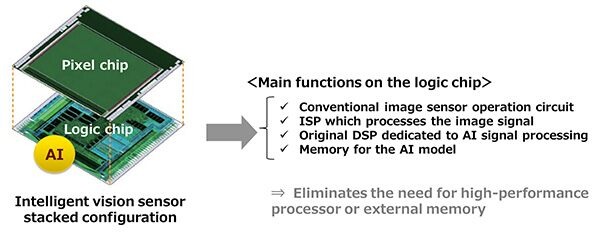Microsoft Just Gave The Sony AI Camera An Azure Brain
It was only last week that Sony showed off its new embedded AI smart camera sensor, and already Microsoft is promising an artificial intelligence for the innovative chip. The Sony IMX500 stacks a 12.3-megapixel CMOS on top of a dedicated custom AI processor, paving the way for new cameras that can do their own object and pattern recognition, person tracking, and more.
Typically, that sort of crunching would require a separate chip for ISP. Sony's idea is to combine the two, improving efficiency and making for a cheaper package overall. Target segments include smart security cameras and industrial cameras, with manufacturers able to load their own AI right into the IMX500's memory.
Now, there'll be an Azure AI option. Microsoft and Sony have partnered up to embed Azure AI into the IMX500, while Sony will also be building a smart camera managed app – powered by Azure IoT and Cognitive Services – to bolster the video analytics possible in the cloud. It'll make for a more turnkey route for camera-makers to tap into advanced functionality like stock monitoring and more.

For example, a smart camera combining the Sony chip and Microsoft AI might track when store shelves are in need of restocking, or when lines at cash registers are forming. Smart cameras could also monitor for potential industrial hazards – such as spills on a factory floor – and gather information on patterns around how customers are shopping.
They're not necessarily new features, but Microsoft and Sony say that their tag-team AI and chip tech could make them more readily scaled, cheaper, and efficient. The IMX500 will be able to better balance its own workload and what's handed off to the cloud to process, for example; it'll also allow for dedicated, task-specific programming, which can still benefit from the security provisions from the two companies.

The expectation is that the deal will prove appealing to independent software vendors already providing computer vision and video analytics systems, and to camera manufacturers hoping to add new features to their range. Enterprise users, meanwhile, should find it easy to sift through AI models for their video analytics, potentially making better use of existing hardware.
As well as its 12.3-megapixel still image capabilities, the IMX500 sensor can shoot 4K video at up to 60fps, or 1080p video at up to 240fps. With full AI processing running in real-time, meanwhile, it'll dip to 30 fps. Sony says it began shipping bare chip samples in April, and will have packaged chip products from June. The first commercial products using the IMX500 are likely to arrive on the market in Q1 2021, meanwhile.
